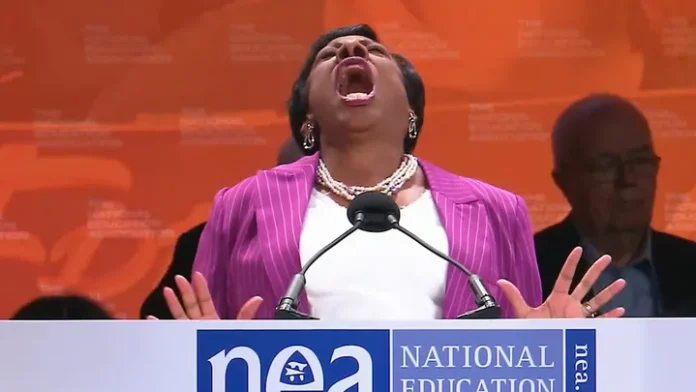NEA President Becky Pringle faced widespread mockery after delivering an animated speech at the NEA’s Annual Meeting and Representative Assembly in Philadelphia. Critics derided her passionate delivery as reminiscent of a comedic skit from “The Office, likening her mannerisms to those of Dwight Schrute, a character known for his intense and eccentric behavior.
During her address, Pringle energetically emphasized the NEA’s mission to bring about transformative social justice reforms in the education system, advocating for equity and fairness. She passionately called upon delegates to unite in reclaiming public education as a cornerstone of democracy and reshaping it into a system that fosters racial and social justice.
We worked hard to rid ourselves of a tyrannical, deceitful, and corrupt White House, but the reality is that the seeds that were sown during that horrible season continue to germinate, Pringle declared, urging steadfast commitment to the NEA’s goals.
Speech reached a crescendo with a rallying cry: “Our students are depending on us to win all the things! All the things! All the things!” Critics, including school choice advocate Corey DeAngelis, lambasted her performance as off-the-rails and compared it directly to Dwight Schrute’s impassioned speeches on The Office.
DeAngelis criticized Pringle and the NEA for what he perceived as excessive control over education policy, advocating instead for defunding teachers’ unions to empower parents and students.
Critics further pointed out that Pringle’s fervent delivery and dramatic gestures resembled Dwight Schrute’s memorable speeches, where he passionately rallied his colleagues in a manner bordering on the absurd. The comparison drew attention to the perceived theatricality and intensity of Pringle’s address.
Jason Bedrick from the Heritage Foundation argued that Pringle’s speech inadvertently underscored the case for school choice, emphasizing the public’s eroding trust in traditional public education systems. He highlighted Pringle’s assertion of trust placed in the NEA amidst record-low confidence in public schools, suggesting her rhetoric may have backfired by drawing attention to ongoing challenges and controversies within the education sector.
Matt Dole, a political consultant, humorously suggested that Dwight Schrute might have served as Pringle’s speech coach, echoing sentiments about the speech’s theatricality and dramatic flair.
This incident was not the first time Pringle’s speeches have drawn comparisons to Dwight Schrute. Last year, critics also remarked on the perceived radicalism and fervor in her addresses, portraying her as a revolutionary figure within the education advocacy sphere.
Despite the controversy, Pringle’s speech underscored the NEA’s commitment to advancing progressive educational policies and social justice initiatives. However, it also reignited debates about the role of teachers’ unions in shaping educational policy and the effectiveness of their advocacy efforts.
Critics highlighted broader issues within the education system, including concerns over academic performance, accountability for underperforming schools, and the impact of union policies on student outcomes. These discussions reflect ongoing tensions between advocates for traditional public education and proponents of alternative approaches, such as charter schools and school choice initiatives.
The fallout from Pringle’s speech also prompted reflections on the state of public education in the United States, with calls for greater transparency, accountability, and responsiveness to parental and community concerns. Critics argued that Pringle’s rhetoric, while impassioned, may have overshadowed substantive discussions about improving educational outcomes and addressing systemic challenges.
Moving forward, the incident serves as a reminder of the complex dynamics at play within the education advocacy landscape, where passionate advocacy can sometimes blur the line between effective messaging and theatricality. It also underscores the ongoing need for constructive dialogue and collaboration to achieve meaningful reforms that benefit all students and stakeholders in the education system.
As the Stakeholders across the educational spectrum will continue to grapple with how best to navigate these challenges and chart a course toward educational excellence and equity for all students.























